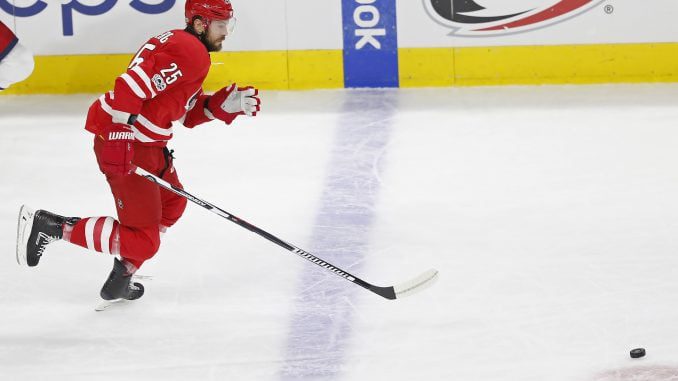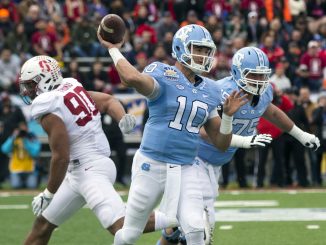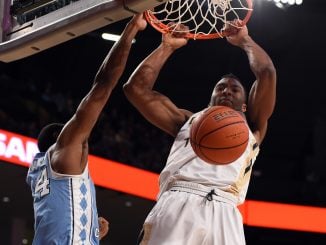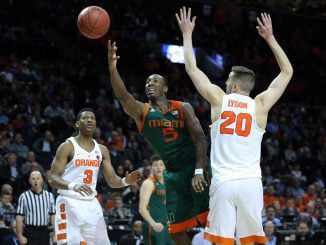
RALEIGH If there’s one aspect of the Carolina Hurricanes that’s been consistently good the past three seasons under coach Bill Peters, it’s the team’s penalty killing.The PK has taken another step forward this year, hovering near the 90-percent mark and ranking tops in the NHL for most of the season. That next gear has come, in part, from newcomer Viktor Stalberg.The 6-foot-3, 209-pound forward is with his fifth team in eight NHL seasons, having signed a one-year, $1.5 million contract with the Hurricanes last summer.”I’m happy with how things have worked out so far,” Stalberg said. “I think looking at what they wanted out of me coming out on the PK, playing that bottom-six role I think I’ve done a good job.”Stalberg, 31, took an unconventional route to the NHL, leaving Sweden to play at the University of Vermont in 2006.”I had hopes of becoming a pro player, obviously, but I didn’t know if that was something that was going to happen for me when I was 16 or 17, 18,” Stalberg said. “I was cut as a 16-year-old from my junior team, played basically men’s league hockey until I was 18.”Then I found a way to get back. I always thought school was important and I wanted to do that. That opportunity to have in the U.S. to do both is just awesome. In Sweden you can’t do that, so that was basically the main reason for wanting to do it.”Even then Stalberg was planning for options outside of hockey, majoring in finance and being named to All-Academic teams while in college.”I think a college degree is the way to go,” Stalberg said. “A lot of guys, it’s not going to work out to be an NHL player. You get something else to stand on, and it also gives you more time to work on your game. If you have a degree, you can play in the minors for a few years and not be too worried what’s going to happen after college or after hockey.”After three years at Vermont, Stalberg said the Maple Leafs pushed for him to turn pro.”I was thinking about finishing, but it was little too good an opportunity to leave at that time,” he said. “Toronto was struggling and I knew they really wanted me to come and I was able to make that team basically right away. It worked out in the end, but one year is easy to get back at some point if you wanted to.”After scoring nine goals in 40 games and earning some shorthanded time his rookie season in 2009-10 with Toronto, Stalberg was traded to Chicago.He had 43 goals and 90 points in three seasons with the Blackhawks, including being a part of their Stanley Cup-winning team in his final season there in 2012-13. An unrestricted free agent that offseason, Stalberg cashed in with a four-year, $12 million contract with Nashville.Stalberg’s stint with the Predators was short and not-so-sweet he played just 95 games in two years in Nashville before the second half of his contract was bought out.At a career crossroads, Stalberg signed for one year with the Rangers prior to last season. He averaged 12:12 in 75 games, including 76 seconds a night on the team’s 26th-ranked penalty kill.That led him this past summer to Carolina, a team that was looking to get bigger and faster in the bottom-six. It’s a role that has suited Stalberg perfectly.Heading into Friday’s home game against Pittsburgh, Stalberg has seven goals including a shorthanded tally and leads the team in hits with 83. He ranks third among Hurricanes forwards in penalty kill time, logging 63:43 an average of 1:28 per game while teaming up with veteran center Jay McClement on one of Carolina’s top penalty killing units.”I think we’ve had the advantage of both of us being together since Game 1 on the PK, so now we’re pretty in sync with what each other’s going to do and we read off each other and talk,” McClement said of Stalberg. “He’s fit right in and we haven’t skipped a beat.”Stalberg has re-established himself as a valuable bottom-six forward and penalty killer during his year in New York and now Carolina.”Sometimes the perfect fit takes a while to find,” assistant coach Steve Smith, who runs Carolina’s penalty kill, said. “Within organizations he’s been with, maybe they have a young guy coming up that filled that role perfectly that they had just drafted. Who knows what really happened. I can tell you he’s a humble guy, he’s a smart guy. He’s a guy that buys in to what we’re trying to sell around here and he’s been a good fit for us.”Smith said the PK system hasn’t changed much since he came aboard Peters’ staff in 2014, but Stalberg adds another element.”Quite frankly we haven’t had an awful lot of really fast guys,” Smith said. “He’s an extraordinary skater that makes a big difference. … With the addition of speed, that’s just one more component that makes it more difficult on the other team.”Stalberg’s world-class speed and size make him a nightmare for opposing power plays and he often catches defensemen off guard.”Sometimes I don’t think they expect me to be as quick as I am, especially being the size I am,” Stalberg said. “It’s a good weapon to have and I think it brings an element to our team game that we need.”Defenseman Jaccob Slavin, who is a top defenseman on Carolina’s penalty kill and also a point man on their power play, knows what it’s like to play with and against a player like Stalberg.”He has that breakaway speed that if there’s a loose puck he can get on it pretty quickly that their power play doesn’t have much time,” Slavin said. “When you’re defending someone like that, you’ve gotta try to take away their time and space as much as possible, staying up, having tight gaps against them is huge to where they can’t even get going with their speed.”And both Slavin and Stalberg have experienced quickly making the jump from the NCAA to the NHL. That goes back to the decision Stalberg made as a teenager in Sweden.”For me today, that is probably the best decision I’ve made in my life was to go over and play college,” Stalberg said.



